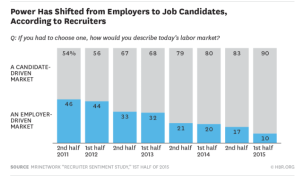Well, there probably still is somewhere. If you’re in the legal profession, maybe it’s still frowned on. If you’re a footballer, maybe – no, I can’t even think of an example, I know that little about sport. If you’re a writer who can’t think of football analogies, though, then it’s fine to get out of that sport website and go somewhere else.
We all used to be told we had to stay in jobs for a decent amount of time. I did it myself. I stayed with one terrible job for exactly a year because I thought less looked bad and would hurt my career chances. It was a bad year. But it had the benefit that I then appreciated every good job I got and ultimately it probably helped me down the line toward going freelance.
There’s just no way to know whether I was right to stay or should’ve got out of Dodge the first chance I got. There’s no way unless I am a carefully-chosen representative sample of many people in many jobs across many careers.
Everyone from your mother to your mentor has advice about the best way to switch jobs. But how can you know whom to trust? Especially since what was true in the job market 20 years ago — even two years ago — is not necessarily gospel now. And the market is constantly changing.
Consider the power dynamic between candidates and employers, for example. Though it differs across industries and regions, and is dependent on the health of the economy, in the past few years, experts have described the current labor market as “candidate-driven.” Job seekers hold more power than employers, a trend that seems to be deepening.
Setting the Record Straight on Switching Jobs – Amy Gallo, Harvard Business Review (10 July 2015)
That graphic was created by Harvard Business Review and you can see it embiggened along with other data in the original article. Read the full piece for this plus an interesting examination of the age-old certainty that you should never tell your current boss that you’re looking to leave.
